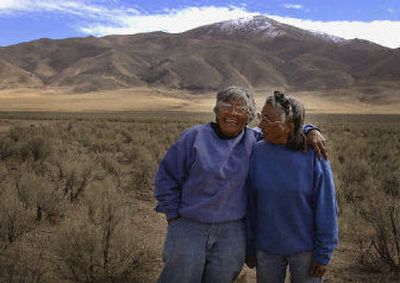Seminar focuses on tribal issues

Carrie Dann’s battle with the United States has played out on Nevada rangeland and in the chambers of the Supreme Court. It’s reached from tribal councils to Congress.
But her efforts to claim property rights for ancestral lands of the Western Shoshone tribe have run into roadblock after roadblock. The federal government has pointed to years of court rulings and a multimillion-dollar trust payment as evidence that the land in question is government property.
Now the issue is finding its way into international tribunals like the United Nations. The results are giving tribal advocates hope that international pressure might help bring about change in the United States.
“The United States has a framework of law that is very outmoded and very discriminatory against Indian nations,” said Robert Coulter, executive director of the Indian Law Resource Center in Helena. “It’s a framework of legal doctrines that have persisted for 200 years and that are so unjust and discriminatory that they make it almost impossible for the Indian nations to improve their social, economic and political situation.”
Dann, Coulter and other experts on matters of indigenous peoples and international law will make a presentation on the case during this weekend’s International Law Symposium, sponsored by the University of Idaho in Coeur d’Alene and Worley.
Dann and her late sister, Mary, have engaged in a decades-long dispute with federal land agencies in Nevada’s Crescent Valley. The Danns argue they were grazing livestock on ancestral Western Shoshone land. The government argues it’s federal land, and has seized livestock and assessed fines totaling $5.5 million against her, said Carrie Dann, who declines to give her age but is older than 70.
“I feel that they owe me that much,” said Dann, referring to the fines. “After all, they are using my land and the land of the Shoshone people.”
Last week, a U.N. committee issued a report urging the United States to halt actions against the Western Shoshone, and to open discussions on the use and occupation of the tribe’s ancestral land. The panel concluded that the process used to transfer millions of acres of Western Shoshone land to federal ownership was discriminatory and in violation of international human rights standards.
Another international group, the Inter-American Commission on Human Rights, issued a report three years ago that concluded the federal claim to Western Shoshone land is illegal and contrary to international law.
The international bodies can’t force change in U.S. laws. But tribal advocates hope they will pressure officials to re-examine U.S. policy.
“With this kind of pressure, it makes it difficult for the U.S. to continue to ignore the issue,” said Julie Fishel, of the Western Shoshone Defense Project.
The long, complicated dispute over Western Shoshone land goes back more than 40 years. The tribe claims its ancestral lands cover more than 60 million acres in Nevada, Idaho, Utah and Colorado; the government has identified the lands in question at less than half that.
In 1962, the Indian Claims Commission ruled that the tribe’s ownership rights had been “extinguished by gradual encroachment of settlers and by the acquisition, disposition, or taking of said lands by the United States for its own use and benefit or that of its citizens.”
The government put $27 million in trust for the tribe as payment for the land, and the Supreme Court later ruled that the payment prevented tribal members such as Dann from bringing any further claims against the government.
Critics say such a finding essentially provides a legal framework to justify the takeover of native lands. The international bodies have called for a legal framework that doesn’t allow the extinguishment of aboriginal land rights.
Coulter said the “gradual encroachment” rationale is part of a series of legal theories that place American Indians outside the constitutional protections Americans are supposed to enjoy. U.S. policies toward Indians are still based on the “doctrine of discovery,” which means generally that Indian rights were lost to European conquerors. He also said Congress retains power to take tribal land without compensation.
“Most people don’t know this legal framework exists,” Coulter said. “They’re usually in a state of disbelief when I explain this to them. They assume I’m exaggerating or leaving something out.”
Coulter contends legalized discrimination against Indians has persisted even as the United States made improvements in other arenas of racial injustice. He notes that a 1955 Supreme Court decision found that an Alaskan tribe, the Tee-Hit-Tons, had no ownership rights and that the tribe’s “property interest, if any, is merely that of the right to the use of the land at the Government’s will.”
It was the same Supreme Court that ruled in Brown v. Board of Education that segregated schools were inherently unequal.
“The same judges, the same year, said it was perfectly all right for the U.S. government to take the property of Indian nations without compensation,” Coulter said.
Attempts to reach officials in the State Department to discuss the U.N. committee declaration were unsuccessful Tuesday. But a Bureau of Land Management spokesman in Nevada said the government’s long-running dispute with the Danns was motivated in large part by concerns about overgrazing by the sisters’ livestock.
At one point, the Danns were grazing more than 3,000 cows and horses on land permitted for a few hundred head, spokesman Mike Brown said. The BLM eventually began seizing the livestock in the 1990s after court battles all the way to the Supreme Court failed to produce any change.
“We are an arm of the government,” said Brown. “We are responsive to the Supreme Court. If the Supreme Court says this is public land and we’re in charge of the health of public land … we really had no choice.”
Coulter said he hopes that forums of international law will provide the impetus to reform the laws by helping raise public awareness.
“I think someday we will see a congressional hearing to examine these issues,” he said.